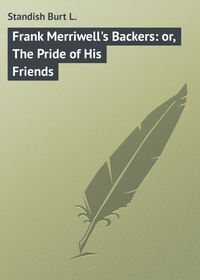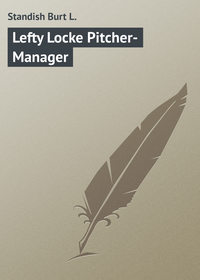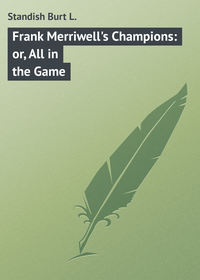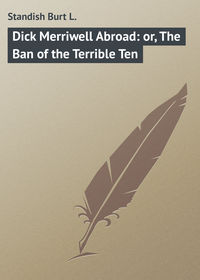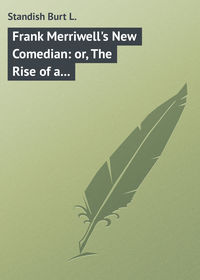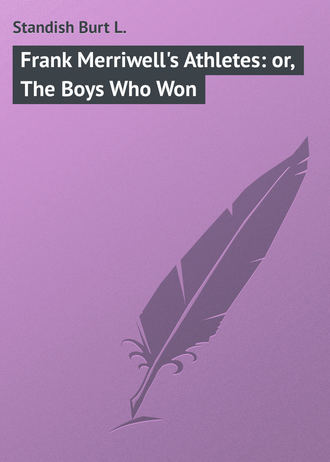 полная версия
полная версияFrank Merriwell's Athletes: or, The Boys Who Won
“Can he keep it up?” thought Frank. “If so, he is the man I’ll have to work hard to beat.”
Over the fourth hurdle they sailed, and then it was that Merriwell and Hodge, still keeping side by side, took the lead, Random being passed, although he was doing his level best.
But the strain was telling on Bart already. His face was drawn into an expression of agony, and he knew he could not keep up that speed to the finish.
As they cleared the fifth hurdle something happened. Hodge seemed to strike the ground awkwardly, and he plunged against Merriwell.
Down both went.
When they scrambled up, Random was in the lead, and he had secured a decided advantage – an advantage that it was not going to be easy to overcome.
Frank was angry and excited. Like a deer he dashed after Wallace.
Still Hodge kept at his side, doing his utmost.
Six, seven, eight hurdles they cleared, and they were close at Random’s heels. Frank felt confident he would be able to win for all of his unfortunate downfall.
“I can do it!” he told himself. “There is a wide space between the ninth and tenth hurdles, and there is where I’ll get ahead of Random.”
Never in all his life had he felt more confident of winning any kind of a contest.
When the ninth hurdle was reached Bart had fallen a trifle to the rear, but he leaped nearly at the same moment with Merriwell.
Then a cry came from Bart as his foot struck and he was thrown forward heavily upon his head.
He struck the ground with a sickening thud, and lay still.
In a moment Frank Merriwell stopped, all thought of winning the race being banished from his mind. He was quickly kneeling beside the fallen lad trying to discover how badly Bart was injured.
Hodge was unconscious, so Frank lifted him and bore him from the track, while Wallace Random raced on and won over Perkins by a wide margin.
Bart was carried into the shade of a large tree, where a physician began to work over him. The physician could not discover that any bones were broken, and he believed Hodge had been stunned by the fall.
This proved true, for Bart was restored to consciousness after a short time, and the first person he saw was Frank close at his side, watching him with the greatest anxiety.
Bart reached out and grasped Merry’s hand, saying feebly:
“It was an accident, old fellow – I swear it was! Don’t think I tried to make you lose the race! No one could induce me to do that, no matter how much they begged me to, Frank! You do not think I did it purposely, do you?”
“No,” said Frank, “I do not think so, Bart.”
“I am glad!” whispered Hodge, thankfully.
Soon the tournament was over, and Santa Barbara was well satisfied, having carried off her share of the honors.
That night there was another hop at the most fashionable hotel of the town.
Frank appeared rather late, and from a place where he could not be seen himself, he watched the dancers.
He was surprised to discover that Inza was not dancing, although she was present. As he watched he saw her refuse several who asked her to dance.
Lord Stanford was given the cold shoulder in a very decisive manner, but there were numberless other girls who were more than glad to dance with him.
He entered the room intending to grasp an opportunity to speak with her.
The moment he appeared Inza retreated toward the other end of the room. He followed hastily, and, catching up with her, said:
“Inza, please do not act in this manner. I have an apology to make.”
He passed his hand through her arm, and they went out on the veranda. The moon was over the mountains again, and its silver light glinted the waves of the sea.
Frank and Inza paused in the shadow of the vines. For some moments he did not speak, and then, his voice quivering, he talked long and earnestly. What he said is neither here nor there. He had an apology to make, and he made it in a manly way. He acknowledged his mistake and freely expressed his contrition.
Inza heard him in silence to the end, then she burst into tears. In a moment both of Frank’s arms were about her, and she was sobbing with her head against his breast.
The following morning Bart Hodge, who had appeared greatly troubled since the race, sought out Frank.
“I want to ask you a question,” he said, earnestly. “Do you think I tried to keep you from winning that race, Frank?”
“Not much, Bart,” replied Merry, cordially. “I know you better than that. But – ”
“Yes?”
“Perhaps you were asked to.”
Hodge flushed.
“We won’t say any more,” continued Frank, grasping his companion’s hand. “Let it be buried in the past. I have been a fool, and I deserve all I got. Here comes the rest of the fellows. We’ll talk over our next move with the Combination.”
CHAPTER XVI – THE ARRIVAL AT EMBUDO
“Embudo! Embudo!”
A brakeman shouted the name at the open door of a passenger car northward bound on the Denver and Rio Grande. The train was stopping at a small station in Northern New Mexico, some fifty miles north of Santa Fe.
“Embudo! Embudo!”
Another brakeman shouted the name at the open door at the other end of the car.
“Embudo! Hurrah!”
Several healthy young voices uttered the cry, and there was a general bustling within that car.
“Here’s where we leave the railroad and civilization behind, Inza,” laughed Frank, who had been chatting with Inza Burrage, who occupied a seat with a stern, hard-faced woman.
“Hurrah!” cried the girl, enthusiastically. “We’re off to the land of the Aborigines! What a jolly adventure it’s bound to be!”
“Goodness!” said the hard-faced woman, reprovingly. “Any one would think you a boy to hear you cheer like that, Inza. Don’t do it again! It isn’t proper.”
“Oh, what’s the use to be so awfully proper all the time, Aunt Abby!” laughed the girl, with a little pout. “How can a person help being enthusiastic with the prospect of such adventures ahead! You’ll see things you never saw before, aunt.”
“And goodness knows we shall all be scalped! I suppose I’m foolish to accompany you on such a foolish expedition.”
“Oh, Frank says there is not the least danger of anything like scalping, and St. Geronimo Day is the great holiday with the Pueblo Indians. I wouldn’t miss it for anything.”
“I assure you, Miss Gale, there is no danger of being scalped or troubled at all by the Indians,” said Frank, who with his friends were bound for the Pueblo of Taos, where they were going to witness the Indian celebration which takes place there each year on St. Geronimo Day.
Inza had communicated with her maiden aunt, who lived in Sacramento, after arriving in Santa Barbara, and Miss Gale had been so wrought up by the girl’s letter, which told how her father had tried to force her into a marriage with a “horrid English reprobate,” that she had packed a trunk and hastened to Santa Barbara.
She found Inza had already “shaken” the Englishman, but Bernard Burrage was such a physical wreck that the good-hearted spinster determined to accompany Inza on the trip East and look out for her.
Mr. Burrage had stopped at Santa Fe, hoping the climate might agree with him.
Frank had heard much about the affair at the Pueblo of Taos on St. Geronimo Day, and he took a vote of the Yale Combine about attending.
The club was unanimously in favor of it, and thus we find them leaving the train at Embudo, the nearest railway station to the Pueblo.
Frank had worked hard to make a favorable impression on Miss Abigail Gale, and had succeeded very well, so he had induced her to take Inza to witness the Indian celebration.
No one but Frank could have succeeded in this, for the spinster detested and feared redskins, but Merry seemed to have some hypnotic influence over her.
Hodge assisted Inza from the train, while Frank aided Miss Abigail to alight, doing so with as much gallantry and grace as if she were a girl of sixteen.
Indeed, her hard face seldom relaxed at all save when she looked at Frank, and then, at times, an expression of positive gentleness would soften her features somewhat.
Frank had not won her good will by aid of a flattering tongue. He believed actions spoke louder than words, and he had taken pains to study her peculiarities that he might know what to do to please her. In this manner he had been remarkably successful with her, although it was Miss Abagail’s firm belief that the entire male sex “didn’t amount to nothing nohow.”
“Look at Frankie, b’ys!” chuckled Barney, giving Ephraim and Hans each a nudge. “It’s a shlick lad he is. If it wasn’t fer him, Inza’d nivver git anywhere at all, at all; but he makes th’ ould hen think she’s a p’ach, an’ she’ll be afther doin’ onnything he loikes fer her to do.”
“By gum! he’s slick,” grinned the boy from Vermont. “I ain’t never seen no female gal ur woman that he wasn’t able to chop ice with when he sot out.”
“Yaw,” nodded Hans, gravely; “he peen aple to chop ices mit der girls ven I lets ’em alone. Uf course he don’d stood no show mit me against.”
“Nivver a bit!” agreed Barney. “It’s yersilf thot’s a great masher. Ye’re a perfict Apollo.”
“You pet my poots!” said the Dutch boy proudly. “I don’d bother Vrankie mit pecause he vos a coot feller, und his feelings I don’d vant to hurt.”
“Go on!” snorted Ephraim, in disgust. “Ye make me sick! Whut sort of a fool noshun hev yeou got inter your fat head? Do you think yeou could cut Frank Merriwell aout with any girl?”
“Say, you peen careful how you talks to me!” said Hans, menacingly. “Uf you don’d, I may be sorry for it! I know vot I can do mit der girls.”
“Thot’s roight, Ephraim,” put in Barney, with a sly wink at the Yankee boy; “he knows phwat he can do. Av he says he can cut Frankie out it’s himsilf thot can do th’ same.”
“Yaw; sometimes I done id shust to shown you.”
Ephraim took his cue, having tumbled when Barney winked.
“Wal, darn my punkins!” he growled. “Yeou make me sick! Mebbe yeou really do think yeou could cut Frank aout?”
“Uf I vant to tried him.”
“Wall, I’ll bet a ’hole barril of yaller-eye beans that yeou can’t do northin’ of the kind, b’gosh! Yeou take me up, if you darst!”
“Betther be careful, Ephraim,” said Barney, in a manner of mock warning. “Ye won’t have inny b’anes to ate nixt winther. Ye see Frankie is payin’ all his attintion to Miss Abigail noo, an’ it’s ounly himself as could do innything wid th’ loikes av her – onliss it is Hans.”
“I’ll stan’ to my bet,” said Gallup. “Hans never could do a dinged thing with Miss Abigail.”
“Vos dot vot I thought, eh?” excitedly exclaimed the Dutch lad. “Veil, I proff him to you! I shown you britty queek alretty vot I done dot directions in. I vos a hustler ven I started out, und don’d you forget him!”
“All right,” grinned Ephraim. “If yeou can cut Frank aout with Miss Abigail darned if I don’t deliver them beans!”
Then the Vermonter and the Irish lad chuckled and nudged each other, anticipating no end of sport, for they knew Hans was in earnest and would make an attempt to win the attention of the spinster.
Embudo is down on the railroad time tables, and that is about as near as it comes to being on earth.
When the party reached the station platform they looked around for the town. To their astonishment all they could see was the little red station house and a lonely water tank. On both sides were towering cliffs of lava, that looked as if they had been scorched and melted by the fiercest of heats, and the boys found it difficult to believe that the sickly creek in sight was the Rio Grande River. The little stream made a great fuss as it dashed over a bed that was paved with blocks of black basalt, as if seeking to call attention to itself and its importance.
“Well!” exclaimed Harry, astonished; “jay I be miggered – I mean may I be jiggered!”
“Golly sakes to goodness!” gasped Toots. “Where am we, chilluns?”
Bruce Browning groaned.
“Sold again!” he muttered, in despair. “Why, this is the next stop to the infernal regions!”
“Where’s the town?” asked Diamond.
A man who wore a silk hat on the back of his head and carried his hands in the pockets of his striped trousers, which – marvel of marvels! – bore traces of a crease, came forward and said:
“The town, gents, is right across the river there. It is not quite as large as Santa Fe, but it serves as a stopping place all right, if you are on your way to Taos, which I reckon you are.”
He eyed them closely, as if sizing them up. His eyes were piercing, and his mustache was coal-black. There was that in his appearance that pronounced him a gambler.
The boys thanked him and looked for the town.
They discovered a long, low adobe building, and that constituted the entire town. It was the post office, hotel and general store, and was kept by a Mexican, who was on hand at the station to get the mail.
A number of passengers beside Frank and his friends left the train.
Frank went ahead toward the baggage car to look out for the luggage.
The station agent was a beardless youth, to whom the arrival of a train was a most welcome break of the lonely monotony of the place. He was hurrying about and showing his importance.
About the station were several loungers, Mexicans and Indians.
Barely had Frank gone forward when he was startled to hear a loud scream, which he recognized as the voice of Inza.
That scream told him something of a startling nature had happened, and like a flash he whirled about.
He was astonished to see Inza struggling in the the arms of a blanketed Indian, who seemed attempting to lift her and carry her off bodily.
With a pantherlike bound, Merry sprang to the rescue.
Quick as he was, another person was on hand ahead of him.
A tall, swarthy young man, dressed in plain clothes, which seemed to fit his magnificent form very well, leaped at the Indian and the girl, tore them apart, and knocked the redskin down with a single straight-from-the-shoulder blow.
It was all over in a second, and the rescuer was saying something to reassure the frightened girl.
All over?
Not quite!
As the Indian who had been knocked down started up in a dazed way, lifting himself with one hand, the man who wore the silk hat whipped out a long-barreled revolver, coolly observing:
“Here is where I assist Uncle Sam in settling the Indian question.”
In another moment he would have shot the Indian, but Frank was in time to grasp his wrist and turn the revolver skyward.
The weapon spoke, and the bullet flattened against the face of the lava cliff above.
The man turned his dark eyes on Frank, and the boy saw a blazing devil in their depths. His face turned crimson, but his voice was still quite cool, as he addressed Merriwell:
“My dear young man, do you know it is very dangerous to chip into a game like that?”
“I saved you from committing murder, sir,” said Frank, equally as cool.
The man’s teeth seemed to gleam through that black mustache.
“Murder!” he said, scornfully. “You kept me from shooting a dog, that’s all. If you will take your hand off my wrist, I’ll do the job now.”
“No, you must not!”
Never had Frank seen a more dangerous look on the face of a living man. He felt that wrist tremble beneath his fingers.
“You are a tenderfoot,” said the owner of the silk hat. “If you were anything else – Well, this would mean your funeral! I am ashamed to shoot you, but I may forget myself if you do not withdraw from the game.”
“If you will promise to put up that gun and let this drunken Indian go, I will withdraw.”
“Did you ever hear of Dan Carver?”
“Yes.”
“I am Carver.”
CHAPTER XVII – OFF FOR PUEBLO
Frank was astonished, but his face showed not the least sign of surprise. Carver was a Western sport and “bad man.” It was said that, when aroused, he was more dangerous than a hundred rattlesnakes.
“Well, Mr. Carver,” said Frank, “I have heard that it is your custom to do your shooting first and your palavering afterward; but I trust you will break the rule in this case. I have heard that you claim to be a gentleman, and, as a gentleman, I ask you not to do any shooting here in the presence of these ladies, who are already badly frightened, and would be horrified at the sight of blood.”
“Oh, if you put it that way,” said the man, slowly, “I presume I shall have to throw up my hand, although I feel it a duty to shoot some holes in that drunken redskin.”
“As a favor to the ladies you will not shoot him?”
“As a favor to the ladies, I will not shoot him – here.”
Merry instantly let go of Dan Carver’s wrist, saying:
“I thank you, sir.”
The Indian who had been knocked down had regained his feet by this time. He paused, swaying a bit unsteadily, and glared in a drunken way at Inza and her rescuer, then he turned and staggered away, disappearing around the station.
“The horrid beast!” exclaimed Miss Abigail, who had lifted her parasol, as if to strike him, while she stiffly stood her ground. “Indians are not good for anything anyway. You never can make anything decent out of them, no matter how hard you try.”
“I believe that is what all white folks think,” said the young man who had knocked the drunken savage down. “They may be right.”
There was a trace of bitterness in the words and the tone in which they were spoken.
Frank stared hard at the rescuer, and then, stepping forward, cried:
“I believe I know you! I am sure I do! Why, you are John Swiftwing, and I have played football against you!”
The youth with the swarthy face looked at Frank, and then bowed gravely.
“I am John Swiftwing,” he acknowledged; “and I remember you. You are a Yale man, and your name is Merriwell.”
Frank held out his hand.
“Shake, Swiftwing!” he cried. “I am delighted to see you, although you nearly killed me once on a tackle. Without question, you are the fiercest tackler and the best football player Carlisle has on her team. If she had ten more men like you, she’d wipe up the earth with every Eastern college.”
A gleam shot from the eyes of the other, and he accepted Frank’s hand.
“You speak as if you mean it,” he said, “and I thank you.”
“I do mean it,” declared Frank. “Why, all the Eastern papers said so! You showed yourself a wonder. You play football as if your life depended on it.”
“Yes. It is the only white man’s game worth playing.”
“I can’t agree with you there. I consider baseball superior.”
Swiftwing shook his head.
“No,” he said; “it is too tame. Football is like a battle, and it makes one’s blood tingle.”
“Well, I wish to thank you for your ready intervention in behalf of this young lady, who is a friend of mine. Permit me to introduce you. Miss Burrage, this is Mr. Swiftwing, a Carlisle student.”
The young man bowed with a grace that was natural and pleasing, lifting his hat as he did so.
Impulsively Inza held out her gloved hand.
“Mr. Swiftwing,” she said, “I am awfully glad to know you, and, oh! I want to thank you so much for what you just did! That – that drunken – man nearly scared me to death.”
“Why didn’t you say that drunken Indian, as you started to, Miss Burrage?” asked Swiftwing, with something like a bitter smile. “White men never get drunk, I believe!”
“Goodness, yes they do!” exclaimed Miss Abigail; “but not all of them get drunk. All Indians get drunk.”
“Not all of them, madam – I beg your pardon. I have never tasted a drop of liquor in my life.”
“You – you? Why – why – you are – are not – ”
“Miss Gale,” said Frank, “allow me to introduce Mr. Swiftwing, who is a full-blooded Indian and a student at the school in Carlisle, Pennsylvania.”
The spinster looked astonished, nearly dropping her parasol.
“Gracious me!” she fluttered. “Him an Indian? Why, he’s dressed decent, and I’d never suspected it if you hadn’t said so. My, my! what a surprise!”
She did not offer to shake hands, but Swiftwing bowed to her quite as courteously as he had to Inza.
The other boys crowded around, and Frank introduced them all to the Carlisle student, to whom he explained that they were on their way to the Pueblo of Taos.
“But how do you happen to be away out here, Swiftwing?” asked Frank. “Is your home near here?”
“My home is at the Pueblo of Taos, and I am on my way thither.”
“That is remarkable! You are not done at Carlisle?”
“No, I have another year there. I became hungry for a sight of home, and that is how I happen to be here.”
“How do you travel from here?”
“By horse. I suppose you will go by stage. Ramon Griego will carry you.”
“Yes, we go that way; but we’ll see you again at the Pueblo. I wish to have a talk with you.”
“And so do I,” declared Inza, sincerely, regarding the Indian with admiration. “I want to thank you again for what you did. It was splendid of you.”
She held out her hand once more. John took it, bowed low, and, to her surprise, lifted it to his lips. It was an act that astonished Frank more than any one else, for, despite what he knew of Swiftwing, he had felt that the Indian was incapable of such a thing.
With a wave of his hand to Frank and the others, Swiftwing turned and walked away.
“He is a splendid fellow!” said Inza, a flush on her cheeks. “I did not suppose there could be such a difference between two Indians.”
“Look out, Frankie, me b’y!” chuckled Barney. “It’s a rid roival ye’ll have th’ firrust thing ye know.”
Miss Abigail gave a contemptuous sniff.
“He appeared all right,” she said “but even he is an Indian, and no Indian can ever be like a white man.”
It seemed that John Swiftwing’s ears were remarkably keen, for he seemed to hear those words, and he paused suddenly, turning about with a proud gesture. He was at the corner of the station, and not one of that group ever forgot how he looked as he stood there, looking back at them with all the haughtiness of his nature aroused. With something like a gesture of anger and disdain, he turned again and vanished around the corner.
A moment later he was seen galloping away on the back of a tough little pony, going like the wind and riding like a Centaur.
“How could you have said that so he could hear you, aunt!” pouted Inza, her eyes following the retreating figure of Swiftwing. “It was too bad, after all he did for – for me!”
Barney nudged Frank in the ribs, whispering:
“Didn’t Oi tell yez! It’s shtuck she is alriddy.”
Frank laughed carelessly.
“I didn’t think he could hear me,” said the spinster; “but it was true, anyhow. He’s got on a white man’s clothes, but that don’t make him like a white man.”
“Yaw!” put in Hans Dunnerwust, getting nearer Miss Abigail; “dot peen so, you pet.”
The old maid gave him a scornful look.
“What do you know about it!” she exclaimed.
“Oxcuse me,” said the Dutch boy. “You took mein vord for dot.”
“I wouldn’t take your word for anything,” sniffed Miss Abigail, as she turned away.
Barney and Ephraim chuckled, and Hans looked rather crestfallen, shaking his head and muttering:
“Vale, she vos a pird!”
The train pulled out of the station, and the party crossed the footbridge to the adobe building.
In front of the building stood two light platform wagons, to each of which were attached two of those diminutive broncho ponies whose endurance has so many surprises.
These were the stages of Ramon Griego & Co.
Curiously enough, the firm with this imposing name was composed of two Mexican boys, who were brothers, and who carried a long star route into the mountains, gathering and delivering mail pouches at a number of little settlements on the way.
Ramon proved to be a bright, well-dressed young man, and could speak English fluently, a fact worthy of note in a land where the inhabitants of the isolated hamlets are three hundred years behind the times.
He had been expecting a large number of passengers, and was prepared for them.
Frank’s party took up one entire wagon, and it was a big load for the little bronchos. If Frank had not known what sort of stuff there was in the little animals, he might have hesitated about starting out with a wagon load of twelve persons, to say nothing of several mail pouches.
The driver, a Mexican lad, occupied a seat with Toots. He cracked his long whip and uttered a yell. The little bronchos started slowly, broke into a run, and away they went, with the boys waving their hats and cheering, while Inza fluttered her handkerchief to the Mexican postmaster, who was standing in the open doorway.




